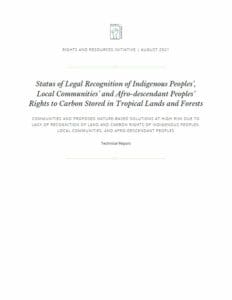Date: July 23, 2021
This study reviews the status of the legal recognition of the rights of Indigenous Peoples, local communities, and Afro-descendant Peoples to the carbon in their lands and territories across 31 countries in Africa, Asia, and Latin America. Together, these countries hold almost 70% of the world’s tropical forests and the bulk of nature-based emissions reductions and carbon offset opportunities.
Key findings from the research include:
- Only 3 of the 31 countries studied explicitly recognize community rights to carbon on lands owned by or designated for communities (Ethiopia, Peru, Republic of the Congo).
- Just 3 countries (Brazil, Colombia, Costa Rica) tie carbon rights to land or forest ownership.
- 7 other countries (Bhutan, Fiji, Nepal, Nicaragua, Tanzania, Vietnam, Zambia) have ambiguous legal frameworks that could be interpreted to recognize community carbon rights.
- Only 5 countries (Costa Rica, Indonesia, Mexico, Philippines, and Vietnam) have mechanisms that define how carbon and non-carbon benefits will be shared and only one of these (Vietnam) was verified as being partially operational.
- Only 2 of the 17 countries that developed feedback and grievance redress mechanisms have operationalized them (Costa Rica and Mexico).
The findings in this report demonstrate that few countries have established the necessary conditions for fair, effective, and transparent carbon or REDD+ transactions. Overall, few countries explicitly recognize community carbon rights, and even fewer have tested the operational and political feasibility of established rules. The limited attention to community rights thus lies in stark contrast to the substantial investments that have been made so far to measure the carbon located in communities’ lands — a situation made worse by the general lack of safeguards and benefit-sharing mechanisms. Read more about this research here.
https://doi.org/10.53892/MLQQ5744

